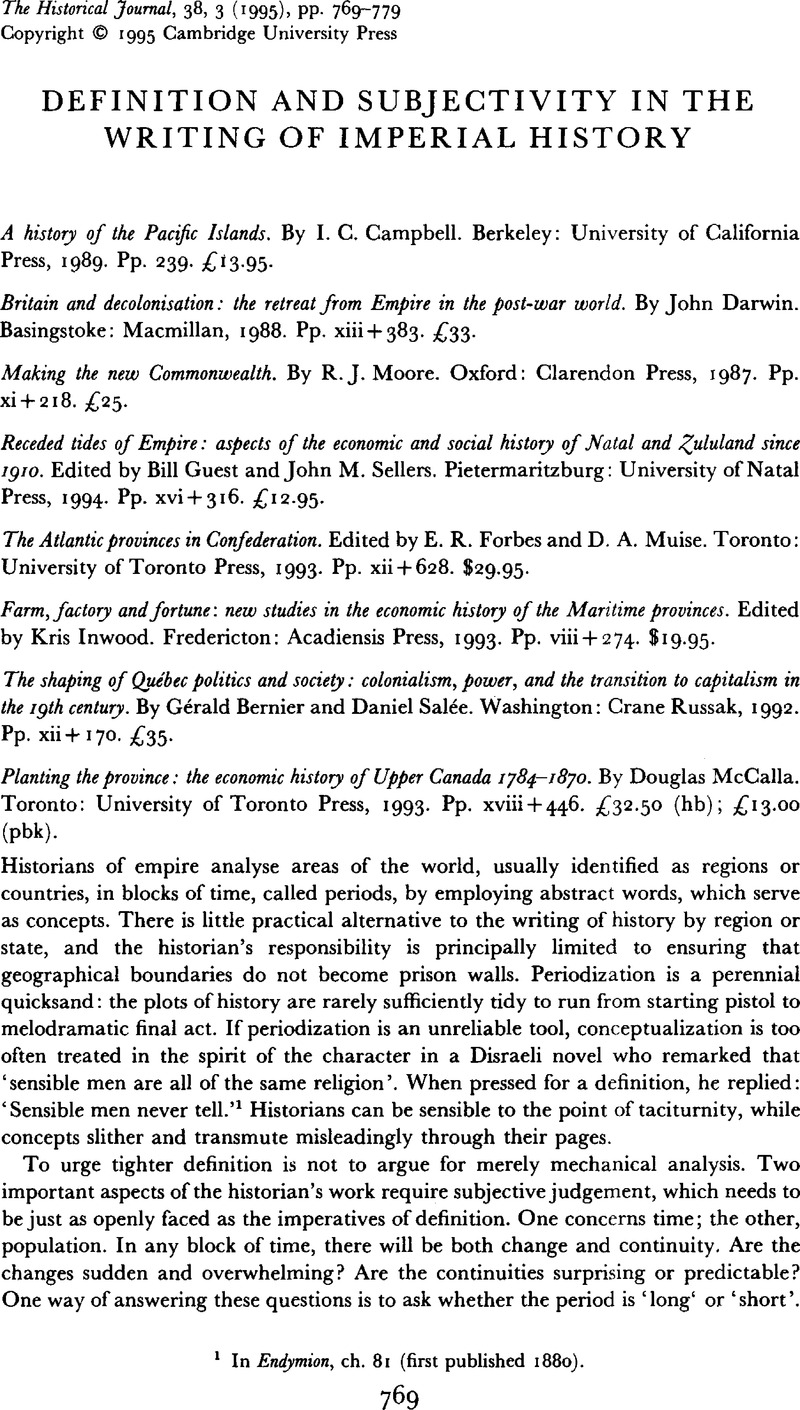No CrossRef data available.
Article contents
Definition and subjectivity in the writing of imperial history
Published online by Cambridge University Press: 11 February 2009
Abstract

- Type
- Review Articles
- Information
- Copyright
- Copyright © Cambridge University Press 1995
References
1 In Endymion, ch. 81 (first published 1880).
2 Speech on reform, 1831, The works of the Rev. Sydney Smith (London, 1856 edn), p. 570Google Scholar. The more rapid passage of subjective time in the twentieth century may be noted from the aphorism attributed to Harold Wilson, c. 1964: ‘A week is a long time in polities’. No precise source exists for the saying. Partington, A., ed., The Oxford dictionary of quotations (4th edn, Oxford, 1992), p. 780.Google Scholar
3 By taking the years between 1946 and 1949 as the period in which India and Pakistan made their decisions to remain in the Commonwealth, Moore makes only passing reference to earlier attempts to accommodate congress demands within the device of Dominion status. There is no dialogue with Mehrotra, S. E., India and the Commonwealth 1885–1929 (London, 1965).Google Scholar
4 Quoted in Edgar, H. Brooks and de B. Webb, C., A history of Natal (Pietermaritzburg, 1967), p. 68.Google Scholar
5 Anthony, Lumby and Ian, McLean, ‘The economy and the development of the Port of Durban’Google Scholar; Bill, Guest, ‘An introduction to the post-Union Natal coal industry’Google Scholar and Mark, Addleson, ‘An overview of the growth of manufacturing in Natal’ in Guest, and Sellers, , eds., Receded tides of Empire, pp. 25–51, 77–112, 137–56.Google Scholar
6 The figure includes provincial acts refused assent after reservation. Eugene, Forsey, Freedom and order: collected essays (Toronto, 1974), pp. 179–85.Google Scholar
7 Hiller, J. K., ‘Newfoundland confronts Canada, 1867–1949’ in Forbes, and Muise, , eds., The Atlantic provinces in Confederation, pp. 349–81.Google Scholar
8 The most sensitive use of the ‘decade’ approach is John, G. Reid, Six crucial decades: times of change in the history of the Maritimes (Halifax, 1987)Google Scholar, which focuses on six key periods between 1600 and 1930. The whole of Canada's history was salami-sliced in two useful surveys, Careless, J. M. S. and Brown, R. Craig, eds., The Canadians 1867–1967 (Toronto, 1968)Google Scholar and Careless, J. M. S., ed., Colonists and Canadiens 1760–1867 (Toronto, 1971)Google Scholar. The same approach was used to bring together a wealth of specialist knowledge at Laurentian University in Wallace, C. M. and Ashley, Thomson, eds., Sudbury: rail town to regional capital (Toronto, 1993)Google Scholar, but makes it difficult for the reader to form longer-term impressions, for instance, of the development of the mining industry and the evolution of the city's important Finnish community. ‘Decades, like people, tend to be personalized by those who have had to live with them’, remarks T. W. Acheson enigmatically in the more recent companion volume to The Atlantic provinces in Confederation, which slips into decades after 1800. Perhaps this is as good a reason as any for avoiding such periodization. Buckner, P. A. and John, G. Reid, eds., The Atlantic region to Confederation: a history (Toronto, 1994), p. 307.CrossRefGoogle Scholar
9 Ommer, R. E., ‘What's wrong with Canadian fish?’ Journal of Canadian Studies, XX (1985), 122–42.CrossRefGoogle Scholar
10 Kris, Inwood, ‘Maritime industrialization from 1870 to 1910: a review of the evidence and its interpretation’Google Scholar in Inwood, , ed., Farm, factory and fortune, p. 170.Google Scholar
11 Ken, Cruikshank, ‘The intercolonial railway, freight rates and the Maritime economy’Google Scholar in ibid. pp. 171–96.
12 Crowther to Gordon Walker, 29 Apr., 1949, in Moore, , Making the new Commonwealth, p. 195.Google Scholar
13 Note by Nehru, 2 Dec. 1948, in ibid. p. 154.


